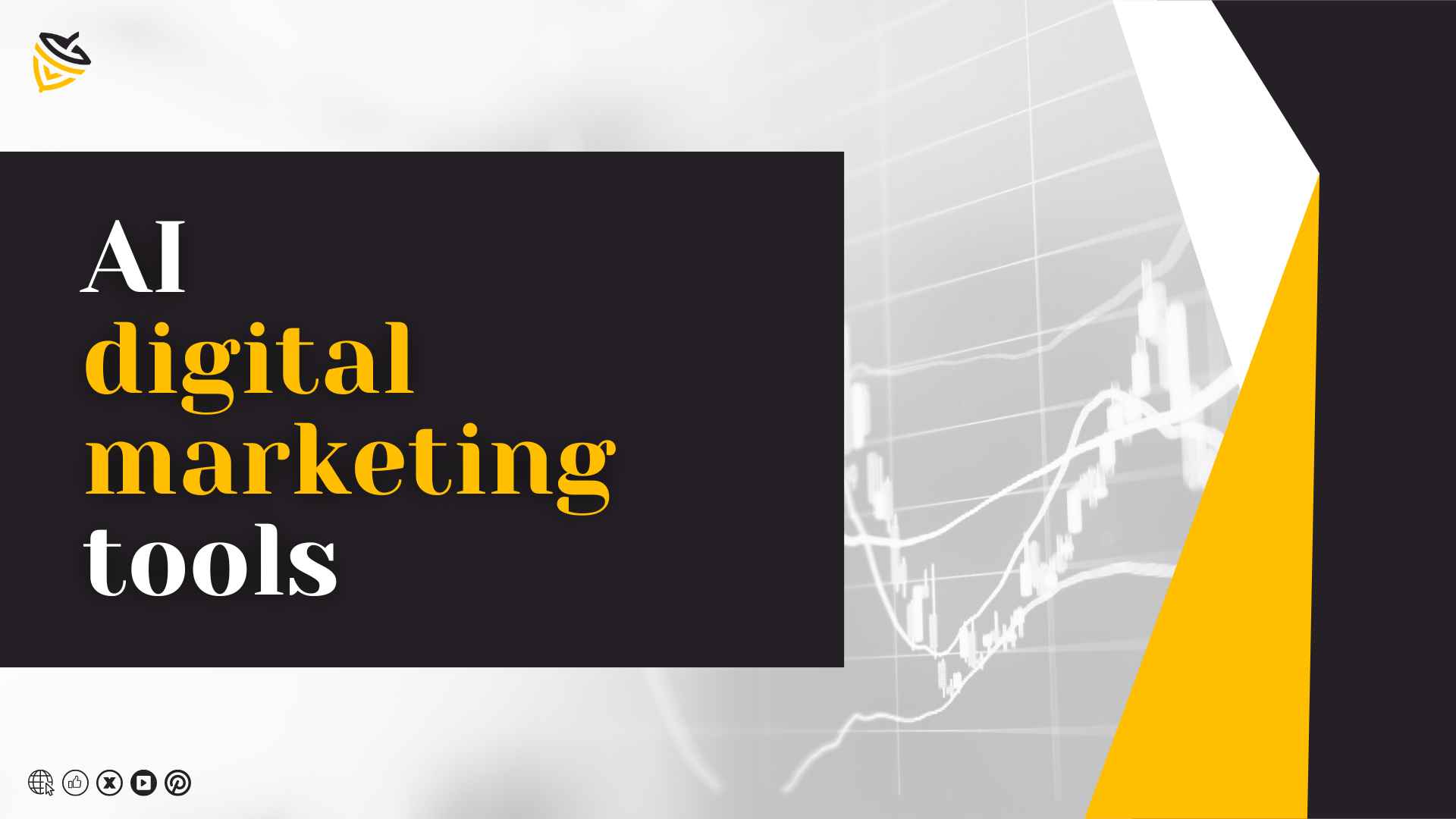
Digital Marketing AI Tools streamline tasks, boost efficiency, and enhance campaign performance. They provide valuable insights and automate repetitive processes. AI tools have revolutionized digital marketing by offering unparalleled precision and efficiency. These tools analyze vast amounts of data to deliver actionable insights, helping marketers make informed decisions. They automate repetitive tasks, saving time and reducing human error. Tools like chatbots enhance customer engagement by providing instant responses.
Predictive analytics tools forecast trends, allowing businesses to stay ahead of the competition. AI-powered content creation tools generate high-quality content tailored to target audiences. By leveraging these Digital Marketing AI Tools, marketers can optimize campaigns, improve ROI, and create personalized customer experiences. Embracing AI in digital marketing is essential for staying competitive in today’s fast-paced digital landscape.
The Rise of AI in Digital Marketing
Artificial Intelligence (AI) is changing digital marketing. It provides innovative tools and strategies. AI helps businesses to understand and reach their audience better.
Evolving Landscape
The digital marketing landscape is evolving rapidly. AI tools are leading this change. They analyze vast amounts of data quickly. This allows marketers to make informed decisions.
AI-powered tools can predict customer behavior. They personalize marketing messages. This increases engagement and conversions.
AI also automates routine tasks. This frees up time for creative work. Marketers can focus on strategy and innovation.
Benefits for Businesses
Businesses gain many benefits from AI in digital marketing. Here are some key advantages:
- Improved Accuracy: AI tools reduce human errors.
- Cost Efficiency: Automation cuts down labor costs.
- Personalization: AI tailors content to individual preferences.
- Data Insights: AI provides deep insights into customer behavior.
- Scalability: AI handles large volumes of data easily.
AI can also help with customer service. Chatbots provide 24/7 support. They answer questions and solve problems instantly.
Below is a table summarizing the benefits of AI tools in digital marketing:
| Benefit | Description |
| Improved Accuracy | Reduces human errors in campaigns. |
| Cost Efficiency | Cuts down labor costs through automation. |
| Personalization | Tailors content to individual preferences. |
| Data Insights | Provides deep insights into customer behavior. |
| Scalability | Handles large volumes of data easily. |
Types of Digital Marketing AI Tools

Digital Marketing AI Tools have revolutionized the marketing landscape. These tools help brands to engage better with their audience. They offer various features, simplifying tasks and enhancing efficiency. Here’s a closer look at the Types of Digital Marketing AI Tools:
Content Creation
AI tools for content creation generate high-quality content quickly. They use algorithms to understand topics and create engaging articles. These tools can write blog posts, social media updates, and even product descriptions. Some popular AI content creation tools include:
- GPT-3
- Copy.ai
- Jarvis
AI content tools help in maintaining consistency and saving time.
Chatbots and Customer Service
AI-powered chatbots enhance customer service experiences. They respond to queries instantly, providing 24/7 support. These bots can handle multiple conversations at once. They improve customer satisfaction and reduce response times. Some notable chatbot tools include:
- Chatfuel
- ManyChat
- Drift
These tools use natural language processing to understand and respond accurately.
Data Analysis and Insights
AI tools for data analysis provide deep insights into customer behavior. They analyze large data sets to identify patterns and trends. This helps marketers make informed decisions. Some top AI data analysis tools are:
- Google Analytics
- HubSpot
- SAS
These tools enable businesses to track performance and optimize strategies.
Personalization At Scale
Digital Marketing AI Tools have transformed how brands connect with customers. These tools enable personalization at scale, making it possible to deliver tailored experiences to millions. Let’s explore how AI achieves this through customized user experiences and targeted marketing campaigns.
Customized User Experiences
AI tools can analyze vast amounts of user data. This allows marketers to create customized user experiences. Imagine a website that changes content based on individual preferences. For example:
- Product recommendations based on browsing history.
- Personalized email content that matches user interests.
Such personalization increases user engagement. Users are more likely to return to a site that feels tailored to them.
Targeted Marketing Campaigns
AI enables targeted marketing campaigns by segmenting audiences. These segments are based on user behavior and preferences. Here are some ways AI can help:
- Identify high-value customers for premium offers.
- Target specific demographics with relevant ads.
- Adjust ad spending based on campaign performance.
This targeted approach ensures that marketing efforts are efficient. It also maximizes ROI.
| Benefit | Description |
| Increased Engagement | Users interact more with personalized content. |
| Higher Conversion Rates | Targeted campaigns lead to better conversions. |
| Cost Efficiency | Ad spending is optimized for better results. |
Enhancing Content Strategy with AI

Artificial Intelligence is transforming the world of digital marketing. One of its most significant impacts is on content strategy. AI tools streamline processes, improve content quality, and boost engagement. Let’s delve into how AI can enhance your content strategy.
Automated Content Generation
AI can automate content creation, saving you time and effort. These tools can generate articles, social media posts, and even video scripts. They analyze existing content and craft new, relevant pieces.
- Speed: AI tools can write content in seconds.
- Consistency: Ensure a uniform tone across all channels.
- Scalability: Produce more content without extra resources.
Using AI, you can also personalize content for different audiences. This means higher engagement and better user experience.
SEO and Content Optimization
AI can significantly enhance your SEO strategy. These tools analyze keywords, backlinks, and search trends. They help you optimize your content to rank higher on search engines.
| Feature | Benefit |
| Keyword Analysis | Identify high-ranking keywords for your niche. |
| Content Recommendations | Get suggestions to improve readability and SEO. |
| Competitor Analysis | Understand what works for your competitors. |
AI tools can also audit your existing content. They identify gaps, suggest improvements, and ensure your content stays relevant.
Incorporating AI into your content strategy makes it more efficient and effective. It ensures your content reaches the right audience and achieves your marketing goals.
AI in Social Media Marketing
Artificial Intelligence is transforming social media marketing. It helps marketers understand their audience better. AI tools can analyze vast amounts of data quickly. These tools improve targeting, engagement, and conversion rates.
Social Listening
Social listening involves monitoring social media platforms. AI tools can track brand mentions and customer sentiments. They analyze conversations and trends related to your brand. This helps marketers respond quickly to customer needs.
AI tools can:
- Identify popular trends and topics.
- Monitor competitors’ activities.
- Analyze customer feedback.
Ad Optimization
Ad optimization is crucial for effective social media marketing. AI tools can analyze ad performance in real-time. They help marketers adjust campaigns for better results. AI can predict which ads will perform best.
Benefits of AI in ad optimization include:
- Improved targeting accuracy.
- Better budget allocation.
- Higher return on investment.
AI tools can automatically test different ad variations. They select the best-performing ones to maximize engagement.
Ethical Considerations and Challenges
Artificial Intelligence (AI) in digital marketing offers many advantages. However, some ethical considerations and challenges must be addressed. These issues range from data privacy to bias in AI algorithms.
Data Privacy
Data privacy remains a major concern in Digital Marketing AI Tools. Businesses collect huge amounts of data to personalize marketing efforts. This data often includes personal information, raising privacy concerns.
Consumers expect their data to be handled securely. Marketers must ensure data is stored and processed ethically. Failure to do so can lead to loss of trust and legal consequences.
Consider these practices to enhance data privacy:
- Use encryption to protect data.
- Ensure data anonymization techniques.
- Implement strict access controls.
These measures help in maintaining customer trust and complying with regulations.
Bias in AI Algorithms
Bias in AI algorithms can lead to unfair marketing practices. Algorithms learn from historical data. If this data contains biases, the AI will replicate them.
For example, an AI tool might favor a particular demographic. This happened because the training data was not diverse. Such biases can harm the brand reputation and alienate customers.
To reduce bias, consider these steps:
- Use diverse datasets for training AI models.
- Regularly audit AI algorithms for bias.
- Incorporate ethical guidelines in AI development.
Ensuring fairness in AI algorithms is crucial for ethical digital marketing. It helps in building a more inclusive brand image.
Predictive Analytics in Marketing

Predictive analytics uses data to foresee future trends. In marketing, this is a game-changer. It helps businesses plan better campaigns. With Digital Marketing AI Tools, brands can now predict what their customers want. This means more targeted and effective marketing strategies.
Forecasting Consumer Behavior
Forecasting consumer behavior means predicting what customers will do next. AI tools analyze past data to understand patterns. They look at purchase history, browsing habits, and social media interactions. This helps in creating personalized experiences.
By knowing what customers want, businesses can offer the right products. This boosts customer satisfaction. It also helps in retaining loyal customers. Predictive analytics provides a clear view of market trends. This helps in staying ahead of competitors.
Improving ROI
Improving ROI is crucial for any business. Predictive analytics helps in optimizing marketing spend. AI tools identify which campaigns will yield the best results. This means more effective use of marketing budgets.
Businesses can focus on high-performing channels. This reduces waste and increases returns. AI can also predict the best times to launch campaigns. This ensures maximum impact and engagement.
Here’s a quick look at how predictive analytics improves ROI:
| Aspect | Benefit |
| Targeted Campaigns | Higher engagement and conversions |
| Optimized Spend | Reduced marketing costs |
| Better Timing | Increased campaign effectiveness |
Future Trends in AI Digital Marketing
The digital marketing landscape continues to evolve rapidly. Digital Marketing AI Tools are leading this transformation. New trends are emerging, promising to reshape how businesses engage with customers. Let’s explore some of these exciting trends.
Voice and Visual Search
Voice search is growing fast. More people use voice assistants like Alexa and Siri. This trend means businesses must optimize for voice queries. Voice search often uses natural language. So, content should be conversational and direct.
Visual search is another game-changer. Users can search using images instead of text. Tools like Google Lens make this possible. Businesses need to ensure their images are high-quality and well-tagged. This increases the chances of appearing in visual search results.
Augmented Reality (AR) Advertising
Augmented Reality (AR) is changing the advertising game. AR ads offer interactive and immersive experiences. Customers can see products in their real environment. This boosts engagement and conversion rates.
For example, furniture stores use AR to let customers visualize pieces in their homes. Fashion brands use AR for virtual try-ons. This technology makes the shopping experience more personal and fun.
| Trend | Description | Benefit |
| Voice Search | Uses voice assistants for search queries | More natural, conversational content |
| Visual Search | Search using images | Higher chances of appearing in results |
| AR Advertising | Interactive, immersive ad experiences | Boosts engagement and conversion rates |
Conclusion
Digital Marketing AI Tools are transforming the industry. They offer efficiency, precision, and insightful data. Embrace these tools to stay ahead in the competitive market. Adopting AI can enhance your strategies, save time, and boost ROI. Stay updated with the latest advancements to maximize your marketing success.
